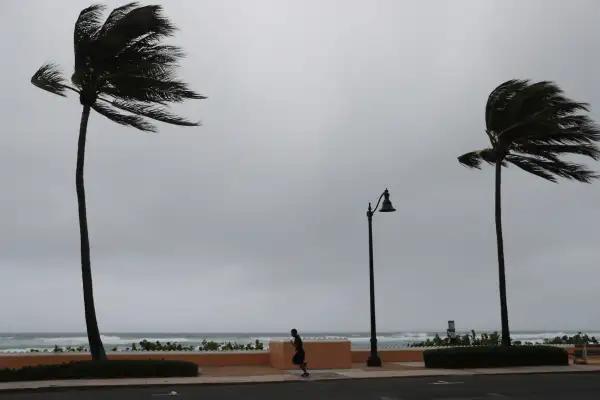Tropical Storm Isaias Is Now On Land. Will Your Insurance Protect Against Floods?

With Tropical Storm Isaias having hit land last night, according to the National Weather Center, causing storm surge and flash flooding in the Carolinas, the disturbance now moves north. That makes this a good time to review how your insurance policies cover (or don't cover) water damage from bad weather.
Hurricanes are defined by their high winds — of a sustained 74 mph or more, to be precise — which makes it easy to mistake wind as their most potentially destructive aspect. Yet as the National Hurricane Center points out, it’s actually storm surge and large waves from hurricanes that “pose the greatest threat to life and property along the coast.” And not only coastal communities are vulnerable. “Storm surge can travel several miles inland,” the NHC points out, as happened with devastating consequences during hurricanes Katrina (in 2005) and Sandy (in 2012).
Isaias was upgraded to a hurricane last night, based on its wind speeds, but has now been restored to tropical-storm status. Yet the National Weather Center predicts heavy rains as Isaias moves up the coast, including "potentially life-threatening urban flooding in D.C., Baltimore, and elsewhere."
Here’s a quick overview of the coverage for water damage that's included with the typical insurance policies on homes and other possessions.
Homeowners policies don't cover damage from floods and storm surges
The rule of thumb with homeowners insurance is that if water directly enters your home from the top, the policy should cover the necessary repairs. If, however, the water touches the ground first, it's technically considered to be a flood. And covering your home for flooding requires a separate insurance policy.
A storm surge isn't a flood technically speaking, but its consequences still aren't covered. According to the International Risk Management Institute, court cases have deemed a storm surge to be “little more than a synonym for a ‘tidal wave’ or ‘wind-driven flood,’ both of which are excluded under most property [insurance].”
Your homeowners insurance will, however, protect you against damage from the rain and wind of a hurricane. Be aware, though, that a different (and higher) hurricane deductible will apply in a number of states, especially when it comes to wind effects. That list of states includes North Carolina and South Carolina, on whose coasts Isaias is expected to make landfall. Carolinians should contact their insurance company to confirm coverage, including when those higher deductibles are triggered.
Comprehensive coverage protects your cars
If your vehicles are damaged by a hurricane, including from flooding or a storm surges, you’re covered if you have what’s known as comprehensive coverage within your auto insurance policy. It’s the optional add-on that covers your car against such threats as theft, falling tree branches, and floods.
Fortunately, about 80% of car owners carry “comprehensive,” according to Mark Friedlander, Director of Corporate Communications with the Insurance Information Institute. But if you happen to have dropped the coverage for cost reasons, consider adding it back. You may even be able to do so in time to be covered should Isaias strike your community, either shortly or as it moves north up the coast later in the week.
Flood insurance takes time to get
Covering your property against flooding, whether from a hurricane or other weather, requires a separate policy. And those cannot be bought if a hurricane is only days or even weeks away from striking your area.
The main source of coverage, the federal National Flood Insurance Program, requires that you apply at least 30 days in advance of the date of coverage. Private insurers who offer flood insurance might write new policies more rapidly, says Insurance Information Institute spokesman Friedlander. But you shouldn’t expect to get a private flood policy is less than about 5 days, he adds.
More from Money:
5 Ways to Lower What You Pay for Car Insurance During Coronavirus
Best Homeowners Insurance Companies of 2020
Here Are All the Major Airlines' COVID Refund and Flight Change Policies
